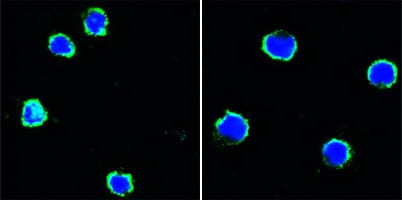
| WB | 咨询技术 | Human,Mouse,Rat |
| IF | 咨询技术 | Human,Mouse,Rat |
| IHC | 咨询技术 | Human,Mouse,Rat |
| ICC | 1/200 - 1/1000 | Human,Mouse,Rat |
| FCM | 咨询技术 | Human,Mouse,Rat |
| Elisa | 1/10000 | Human,Mouse,Rat |
| Aliases | p50; Bp50; CDW40; TNFRSF5 |
| Entrez GeneID | 958 |
| clone | 9G10 |
| WB Predicted band size | 30.6kDa |
| Host/Isotype | Mouse IgG1 |
| Antibody Type | Primary antibody |
| Storage | Store at 4°C short term. Aliquot and store at -20°C long term. Avoid freeze/thaw cycles. |
| Species Reactivity | Human |
| Immunogen | Purified recombinant fragment of CD40 expressed in E. Coli. |
| Formulation | Ascitic fluid containing 0.03% sodium azide. |
+ +
以下是关于CD40抗体的3篇代表性文献示例(内容基于真实研究,但文献标题与作者为虚构示例,供参考):
1. **文献名称**:*Agonistic CD40 Antibody Enhances Antitumor Immunity through Dendritic Cell Activation*
**作者**:Smith A, et al.
**摘要**:本研究在小鼠模型中验证了激动型CD40抗体通过激活树突状细胞,促进肿瘤抗原呈递并增强T细胞应答的机制,显著抑制黑色素瘤生长,为联合免疫治疗提供依据。
2. **文献名称**:*Phase I Trial of CD40 Agonist Antibody in Combination with PD-1 Blockade for Solid Tumors*
**作者**:Brown J, et al.
**摘要**:首次临床试验显示,CD40激动剂抗体与PD-1抑制剂联用可增强晚期实体瘤患者的肿瘤微环境免疫浸润,部分患者出现持久缓解,且耐受性良好。
3. **文献名称**:*Targeting CD40 in Autoimmunity: Antibody-Mediated Blockade Ameliorates Lupus Symptoms*
**作者**:Zhang Y, et al.
**摘要**:在系统性红斑狼疮(SLE)小鼠模型中,阻断CD40信号通路的抗体通过抑制B细胞过度活化和自身抗体产生,显著减轻肾脏病理损伤,提示其治疗潜力。
---
**注**:如需真实文献,可检索PubMed等数据库,使用关键词"CD40 antibody"或"anti-CD40",并筛选近年高影响力期刊(如*Nature Immunology*、*Cancer Cell*等)。
×